6 Free & Open-Source Log Management Tools in 2025
Log management tools and software help IT teams centralize, store, and analyze logs from applications, servers, and cloud environments. A robust log management system accelerates troubleshooting, enables faster issue detection, and reduces costs compared to commercial solutions like Splunk or Datadog. Free and open-source log management tools provide enterprise-grade features for collecting, indexing, and querying logs across distributed systems. Here’s a look at the top open-source log management tools.
Why Use a Log Management Tool?
Log management tools make it possible to collect, centralize, and search logs from servers, applications, and cloud environments in one place. Instead of manually digging through files, teams can quickly find errors, analyze trends, and troubleshoot issues across distributed systems. Choosing the right open-source log management tool can significantly reduce costs compared to commercial platforms like Splunk or Datadog.
6 Free & Open-Source Log Management Tools
Uptrace
License: AGPL v3 (Open Source) / Commercial
GitHub: https://github.com/uptrace/uptrace
Uptrace combines log management with distributed tracing and metrics in a unified observability platform, making it ideal for microservices troubleshooting. The open-source edition is free under AGPL v3, while advanced enterprise features are available in the commercial version.
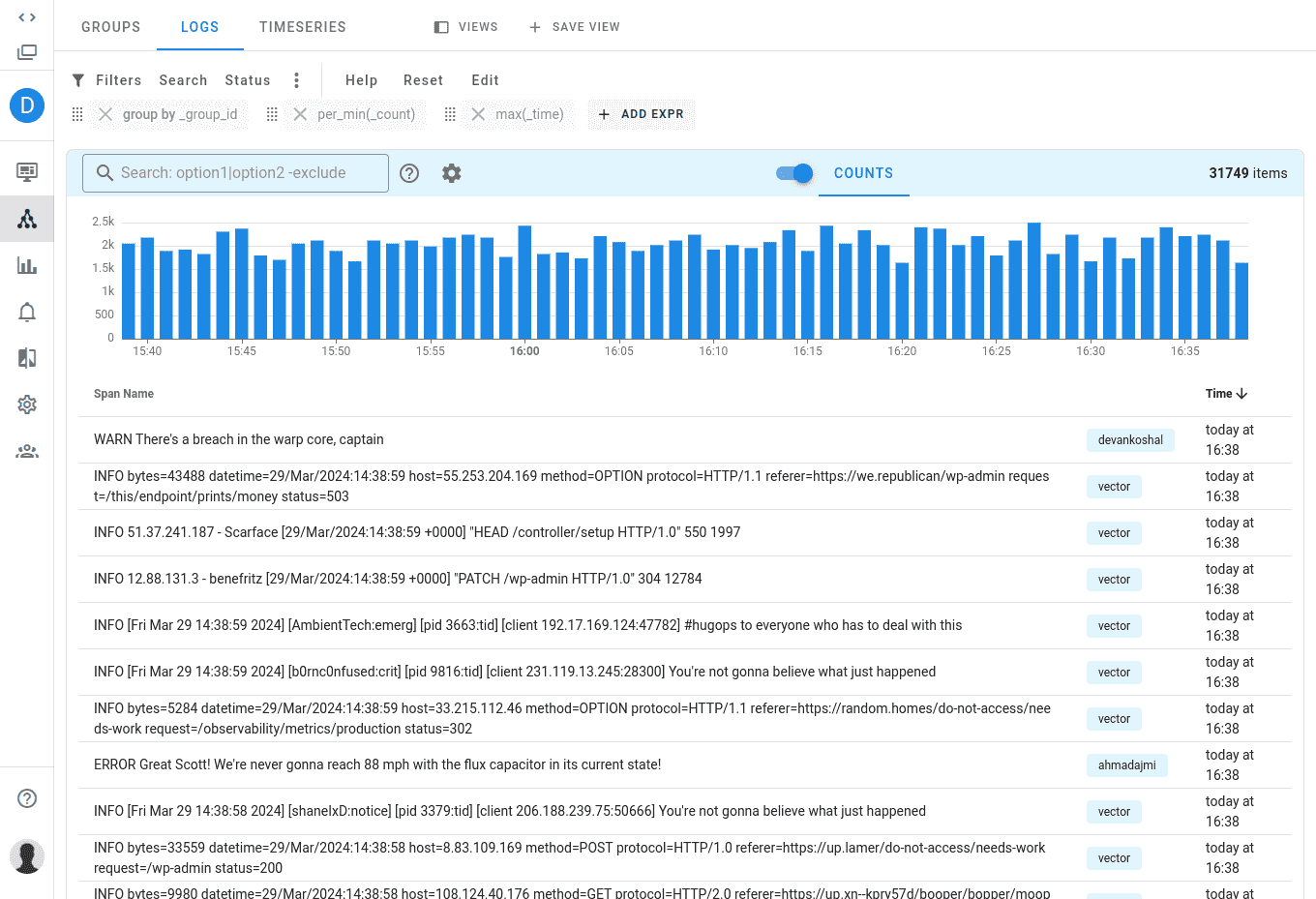
Key Log Management Features:
- Unified log storage for Kubernetes, Docker, and cloud-native applications.
- Trace-to-log linking to correlate error logs with OpenTelemetry traces.
- SQL-like querying with
WHERE,GROUP BY, andORDER BYclauses. - Grafana integration for real-time log visualization.
Why It Stands Out: Brings together log management and distributed tracing in one system.
Grafana Loki
License: GNU AGPL v3
GitHub: https://github.com/grafana/loki
Grafana Loki is an open-source log management tool optimized for cost-efficient storage and high-volume ingestion. Unlike traditional systems, Loki indexes metadata instead of full text, which can reduce storage costs by up to 10x.
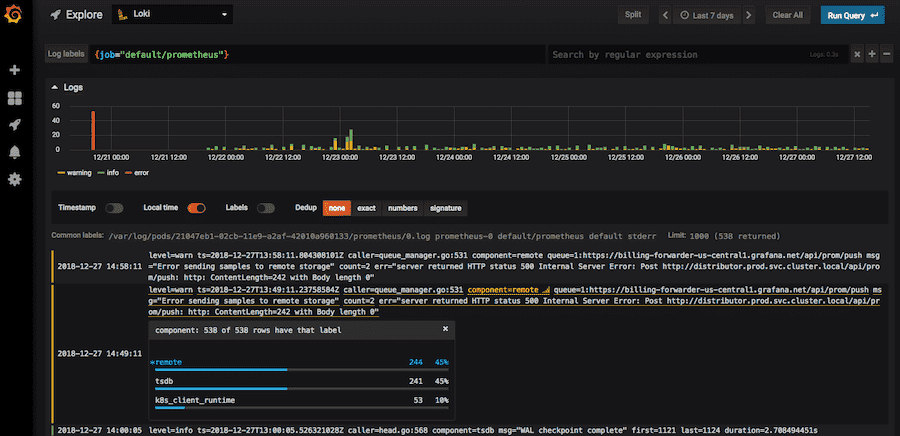
Key Log Management Features:
- Metadata-first indexing for reduced storage costs.
- Kubernetes-native with automatic labeling of pod and container logs.
- Live tail to stream logs in real time via CLI or GUI.
- Prometheus-compatible alerting based on log patterns.
ELK Stack
License: Elastic License 2.0
GitHub: https://github.com/elastic
ELK Stack is a widely adopted log management platform with advanced full-text search and visualization capabilities. The core components (Elasticsearch, Logstash, Kibana) are free under Elastic License 2.0, though the license restricts some commercial use cases.

Key Log Management Features:
- Full-text search across massive datasets.
- Real-time log ingestion and analysis.
- Kibana dashboards for visualizing trends and anomalies.
- Beats agents for lightweight log forwarding.
- Machine learning for anomaly detection.
Vector
License: Mozilla Public License 2.0
GitHub: https://github.com/vectordotdev/vector
Vector is a high-performance log management pipeline designed to process, transform, and route logs across hybrid infrastructures. It is fully open-source and free to use.
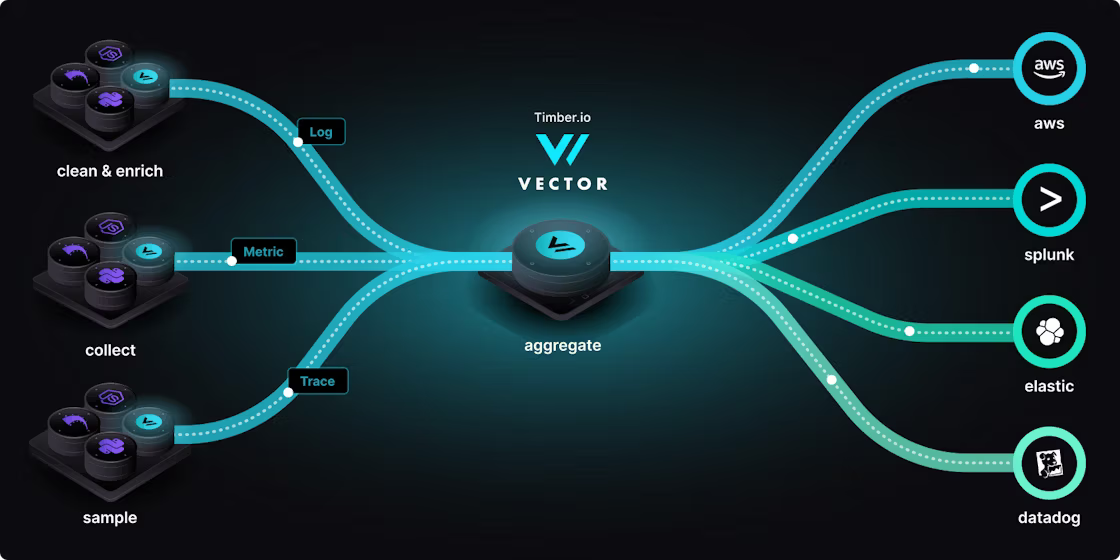
Key Log Management Features:
- 100+ integrations including AWS CloudWatch, Kafka, and Syslog.
- In-stream enrichment for adding fields like user ID or geoIP.
- Edge-optimized to handle logs on IoT devices before transmission.
- Declarative YAML pipelines for observability-as-code.
Graylog
License: Server Side Public License (SSPL)
GitHub: https://github.com/Graylog2/graylog2-server
Graylog is a security-focused log management system used for compliance auditing and threat detection. Its free open-source edition is available under SSPL, with advanced enterprise features offered separately.
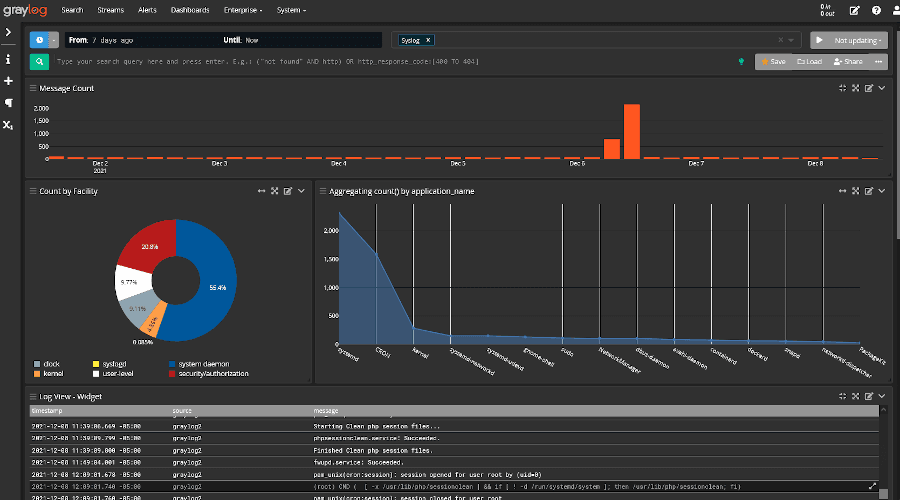
Key Log Management Features:
- GDPR-ready with anonymization and retention policies.
- Threat detection rules for common attack patterns.
- Forensic search with bookmarking and annotation.
- LDAP/AD sync for enterprise user management.
Fluent Bit
License: Apache License 2.0
GitHub: https://github.com/fluent/fluent-bit
Fluent Bit is a lightweight log management agent built for containers, IoT, and edge environments. It is widely adopted in Kubernetes ecosystems and trusted by major cloud providers.
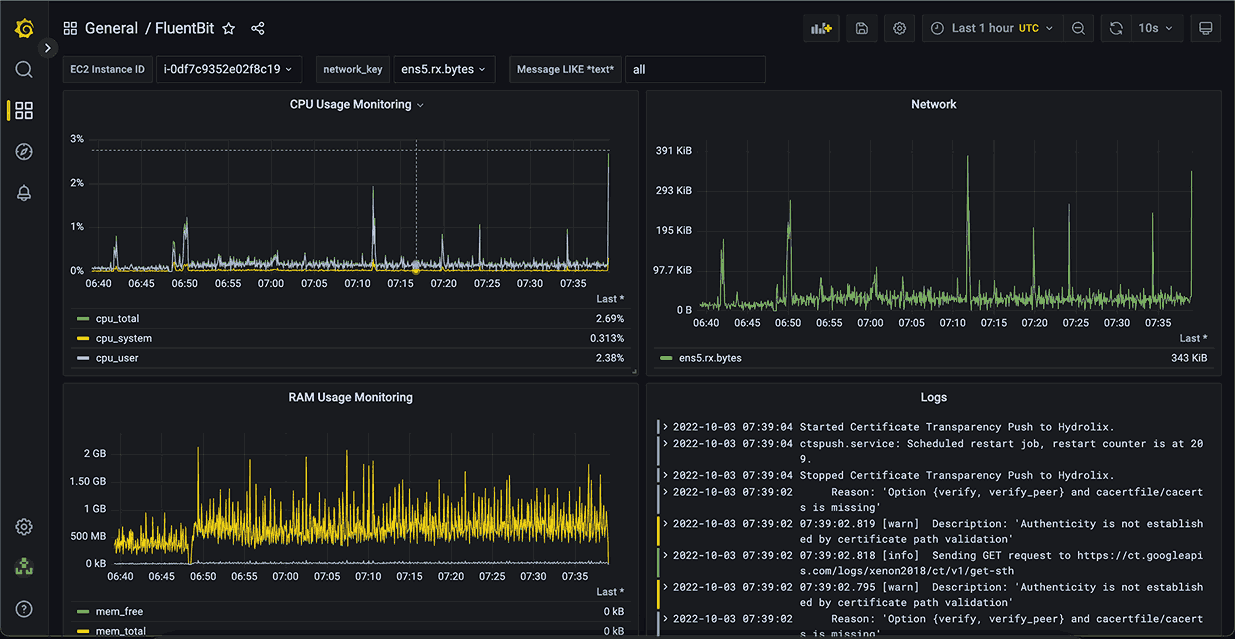
Key Log Management Features:
- Tiny 4MB binary optimized for sidecars and ARM devices.
- Multiline log parsing to handle stack traces.
- Dynamic tagging for routing logs by Kubernetes labels.
- CNCF graduated project backed by AWS, Microsoft, and Google Cloud.
Comparison Table
| Tool | Best For | Storage | Query Language | Cloud Integration | Learning Curve | Type |
|---|---|---|---|---|---|---|
| Uptrace | Unified observability | ClickHouse | SQL-like | Excellent | Low | Log management + tracing |
| ELK Stack | Advanced search | Elasticsearch | Lucene/KQL | Good | High | Full-featured log management |
| Graylog | Security/compliance | MongoDB/OpenSearch | Lucene | Good | Medium | Security-focused log management |
| Loki | Cost efficiency | Object storage | LogQL | Excellent | Low | Scalable log management |
| Vector | Log processing | Multiple | VRL | Excellent | Medium | Log pipeline & management |
| Fluent Bit | Lightweight collection | Multiple | None | Excellent | Low | Lightweight log management |
How to Choose the Right Tool?
- For microservices troubleshooting: Choose Uptrace for trace correlation
- For advanced log search: ELK Stack provides most powerful search capabilities
- For security focus: Graylog offers built-in threat detection
- For cost optimization: Loki minimizes storage costs with metadata indexing
- For complex routing: Vector handles sophisticated log processing pipelines
- For edge/containers: Fluent Bit provides minimal resource footprint
FAQ
What is the best open-source log management tool in 2025?
It depends on your use case: Loki for cost efficiency, Graylog for security, and Uptrace for combined logs and tracing.
What’s the difference between log management and log analysis?
Log management is about collecting, storing, and organizing logs, while log analysis focuses on interpreting and finding patterns within them.
Which free log management software is an alternative to Splunk?
ELK Stack, Loki, and Graylog are the most popular free alternatives to Splunk, each with different strengths in search, scalability, and security.
What are log management systems used for?
They are used to centralize logs, improve troubleshooting, detect issues faster, and provide visibility into applications and infrastructure.
Which tool combines logs with application tracing?
Uptrace specializes in correlating logs with distributed traces and metrics.
What’s the most cost-effective option for high log volumes?
Loki reduces expenses by indexing only metadata instead of full text.
Which tool works best with existing Grafana setups?
Loki integrates seamlessly with Grafana dashboards and Prometheus labeling.
You may also be interested in: